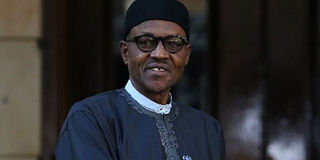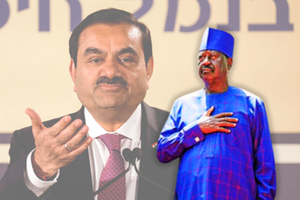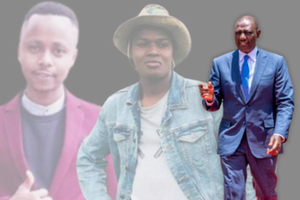10 killed as Biafra anniversary turns bloody

Nigerian President Muhammadu Buhari at Lancaster House in central London on May 12, 2016. PHOTO | AFP | JUSTIN TALLIS
What you need to know:
- Attacks started during march.
LAGOS, Tuesday
At least 10 people were killed during protests by pro-Biafra campaigners as they marked the anniversary of the start of Nigeria’s civil war, police said today.
Activists wanting a separate state for the Igbo people in the southeast were commemorating the 49th anniversary of the declaration of an independent Republic of Biafra on May 30, 1967 led by dissident soldier Chukwuemeka Odumegwu Ojukwu.
The civil war that followed lasted until January 1970 and left more than one million people dead, many of them from starvation and disease.
Police said officers opened fire because members of the Indigenous People of Biafra (IPOB) movement shot at security forces deployed to monitor the protests.
But IPOB spokesman Anayo Chukwu-Okpara denied the claim and said at least 35 members of the group were killed in the commercial hub of Onitsha in Anambra state.
An Anambra police spokesman told AFP “five corpses were recovered” in Onitsha while in the capital of neighbouring Delta state, Asaba, the police said five protesters were killed.
“We had to deploy our officers to ensure that the protest was peaceful but we were surprised that the people turned violent,” said Delta police spokesman Charles Muka.
There was also violence in the capitals of Imo, Ebonyi, Abia and Rivers state, he said.
IPOB leader Nnamdi Kanu has been in custody since his arrest last October on charges of treasonable felony, which has sparked protests demanding his release. The government has repeatedly refused to release him despite several court rulings granting him bail.
Mr Kanu’s brother, Prince Emmanuel Kanu, said of the Onitsha protest: “We are not armed, we only came to remember people who died between 1967 to 1970, that was just our crime to open fire on us.
“What happened on Sunday night at the ground we were supposed to use for the remembrance day, on that evening they opened fire, they shot about 20,” he said.
He said during the march on Monday, 16 people were killed and 56 people were injured.
“They blocked everywhere and all of a sudden they started shooting at us. They shot 56 people, who are injured,” he said.
Federal police chief Solomon Arase on Tuesday said any IPOB member found with a firearm would be arrested and tried, while those held in connection with police deaths would be charged with murder.
The police “will continue to diligently work towards eliminating any threat to internal security”, he said.
Meanwhile, at least four people were killed in central Nigeria in two days of violence over an alleged blasphemy by a Christian trader against Prophet Mohammed, residents told AFP on Tuesday.
Abdullahi Sallau said a Muslim mob killed one person on Sunday and three on Monday in the town of Pandogari in Niger state “following blasphemous remarks by a Christian against the Prophet”.
One of those killed was Methodus Chimaije Emmanuel, the 24-year-old who posted comments on his Facebook page, said Sallau, who lives in the town. His account was supported by another local.
Emmanuel, whose parents were from Nigeria’s mainly Christian south but who was born and raised in Pandogari, had gone into hiding following the post but was found.
“The crowd took the law into their hands and mobbed him to death despite the revulsion expressed by his parents over the online comments,” said Misbahu Malami., who is a local resident.





